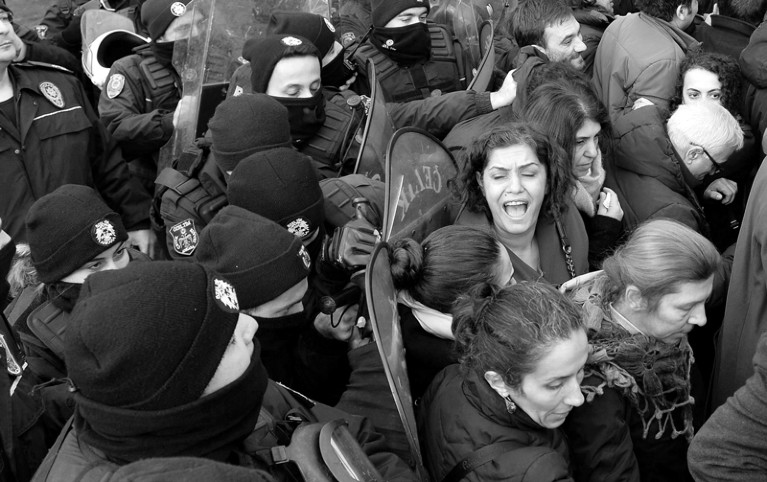
Protests followed the arrest of members of the Turkish Medical Association.Credit: Adem Altan/AFP/Getty
Peace is a dangerous cause to fight for in Turkey right now. In the latest blow to academics, 11 members of the Turkish Medical Association, including its president, Raşit Tükel, were arrested in early-morning raids last week. Their crime? Using the slogan that war is a matter of public health, the association had called for a halt to the Turkish army’s cross-border assault on military units of Syrian Kurds, launched on 20 January to international consternation. (The Kurdish units targeted have been fighting alongside US troops against the Islamist terrorist organization ISIS in northwest Syria.) The raids follow the arrest of more than a thousand academics who signed a petition in January 2016 calling for peace in the country’s southeast, where government forces were fighting Kurdish separatists. Many face criminal charges, and hundreds lost their jobs.
University professors and scientists were also among the 150,000 public servants who were detained and dismissed when draconian laws and a state of emergency were imposed after a failed coup in July 2016. Now, a report published on 18 January by human-rights organizations in Turkey shows that many of those dismissed stand accused of supporting the FETÖ, or Gülen, organization believed by the government to have been behind the coup attempt. Membership in other terrorist organizations is also alleged and, as a result, many of these academics face serious terrorism-related charges.
The report details, as far as it is possible to do so, the arrests, detentions and trials of those caught up in the post-coup purges, and raises concern that miscarriages of justice might be occurring on a large scale. Universities have been hard hit — the report says that 5,822 professors and researchers lost their jobs, 380 of whom were signatories of the 2016 Academics for Peace petition. More than 21,000 health-care professionals were among those fired from public service, and a further 4,113 were judges and prosecutors; their loss partly explains why trials are moving forward so slowly. The report notes that even having downloaded a particular encrypted smartphone text-messaging system (called ByLock), favoured by Gülenists and that prosecutors claim was available only through personal introduction, was enough to condemn someone.
The plight of Turkey’s academics must not be forgotten. They must be allowed fair hearings and trials without further delay. Telling their stories can be powerful, too. Last week, Nature published an interview with theoretical physicist Ali Kaya at Boğaziçi University in Istanbul, who has been charged with being a member of a terrorist organization, about how he managed to carry on his research during his 15 months of incarceration. Colleagues in other countries had tweeted about his achievement — a tactic that other scientists might adopt to help their colleagues in Turkey avoid falling out of the public consciousness.
The general situation in Turkey — whose president is becoming increasingly authoritarian and bellicose, and which hovers on outright civil war — endangers the serious efforts the country has recently been making to improve its research base. As one part of the government oversees mass arrests and orchestrates war, other parts are quietly but determinedly working to fix some of the entrenched problems in the research system. Thousands of new PhD places have been created in recent years, along with some brand-new research institutes, and universities have been energized into competing with each other by offering financial rewards for strong performers. It is a start, and has been enough to persuade at least some young scientists doing postdocs abroad to return home to establish independent research labs.
This is a source of hope in more ways than one. Science can provide a channel for maintaining contact and discussion between countries and cultures in politically tense times. Inevitably, however, like other professionals, many of the scientists making successful careers in Turkey have half-formed emigration plans in mind. The Turkish government needs to make its scientists feel safe. It should revoke the newly extended state of emergency, which has long since outlived its legitimate purpose.

 Science behind bars: How a Turkish physicist wrote research papers in prison
Science behind bars: How a Turkish physicist wrote research papers in prison
 Steps to help Turkey build a future on research
Steps to help Turkey build a future on research
 The Turkish paradox: Can scientists thrive in a state of emergency?
The Turkish paradox: Can scientists thrive in a state of emergency?


